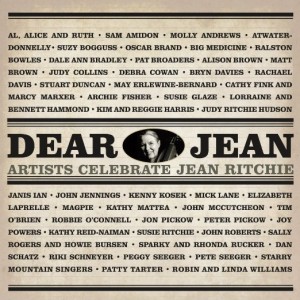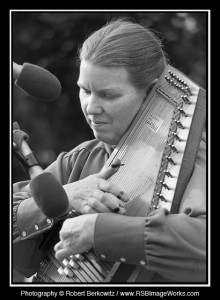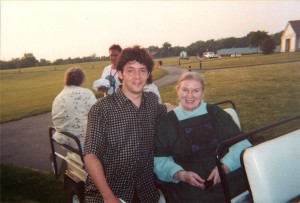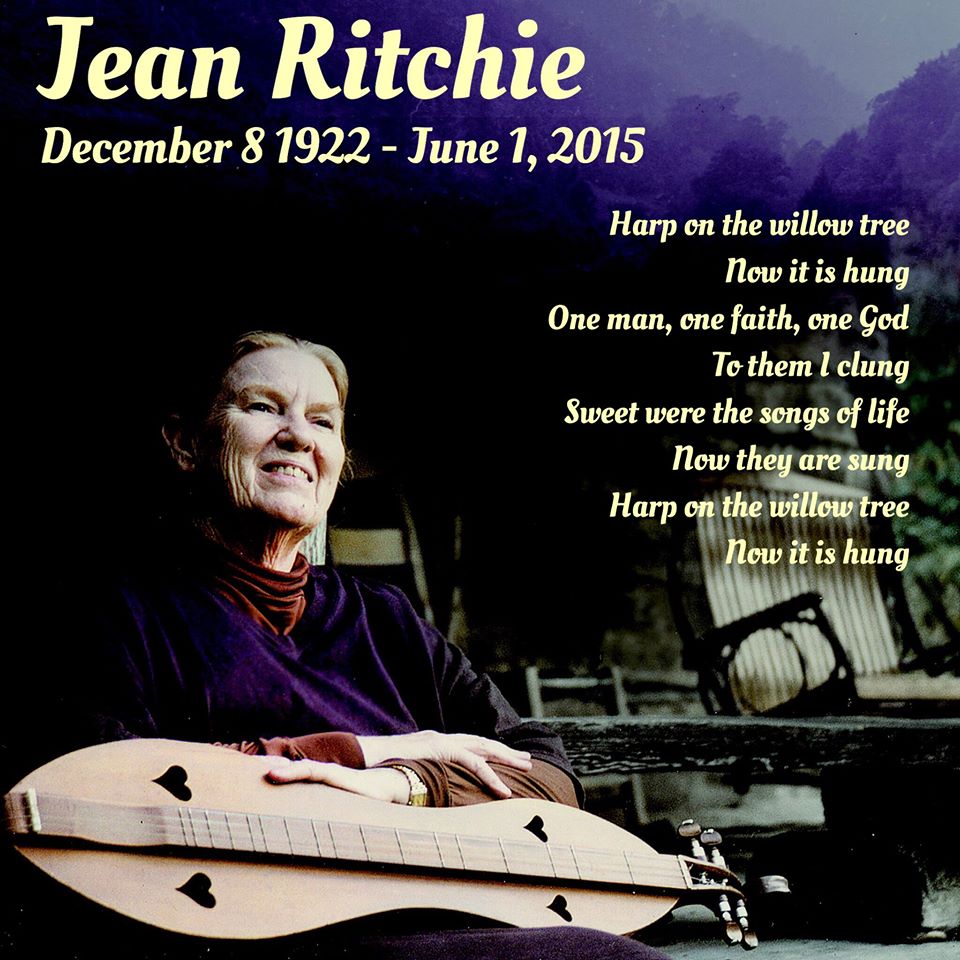The youngest of 14 siblings in a southeastern Kentucky farming family, Ritchie was born Dec. 8, 1922 in Viper, and unincorporated community in the foothills of the Cumberland Mountains. The family was immersed in music, and song was a vital part of her life growing up.
After graduating Phi Beta Kappa in 1946 from the University of Kentucky with a degree in social work in 1946, she moved to New York and worked at the Henry Street Settlement on Manhattan’s Lower East Side, where she taught music to children. It was also there, two years later, that she met her husband, the late photographer and filmmaker George Pickow, at a square dance. The couple settled in Port Washington, Long Island, where they raised two sons – Peter and Jon – who also became musicians and are featured on Ritchie’s 1995 album Mountain Born. Ritchie returned to live in Kentucky in 2010.
Often referred to as “The Mother of Folk,” Ritchie sang with a high, clear, plaintive soprano voice. Although she frequently sang a cappella, she also accompanied herself on mountain dulcimer, as well as guitar and autoharp. Indeed, she is credited with reviving interest in the mountain dulcimer. During the l960s, she and her husband ran a small dulcimer-making business under the Williamsburg Bridge in Brooklyn.
Ritchie was active in the Greenwich Village coffeehouse folk scene of the 1950s and 1960s and was a frequent guest on fellow folksinger and Long Islander Oscar Brand’s “Folksong Festival” on WNYC Radio. In 1952, Electra Records released her debut album, Jean Ritchie Sings the Traditional Songs of Her Kentucky Mountain Family. Also that year, she traveled to Great Britain on a Fulbright Scholarship to trace the roots of her family’s songs. Folklorist Alan Lomax recorded her for the Archive of Folk Song, part of the American Folklife Center at The Library of Congress in Washington, D.C.
During her musical career, Ritchie recorded and released a number of albums and performed on notable stages ranging from New York’s Carnegie Hall to London’s Royal Albert Hall. A frequent performer at the Newport Folk Festival, she graced the stage at the first one in 1959. She also wrote a memoir-songbook entitled Singing Family of the Cumberlands (1955) and published several others.
Jean Ritchie was an Influential Figure Whose Songs Have Been Covered by Other Artists
 Besides collecting, performing, recording and popularizing old ballads like “Barbara Allan” and “Lord Randall” that were brought to Appalachia by British settlers, Ritchie also wrote songs that have been covered by such artists as Johnny Cash (“The L. and N. Don’t Stop Here Anymore”) and Emmylou Harris (“Sweet Sorrow in the Wind”), among others. Another of her notable songs is the anti-strip mining-number “Black Waters.”
Besides collecting, performing, recording and popularizing old ballads like “Barbara Allan” and “Lord Randall” that were brought to Appalachia by British settlers, Ritchie also wrote songs that have been covered by such artists as Johnny Cash (“The L. and N. Don’t Stop Here Anymore”) and Emmylou Harris (“Sweet Sorrow in the Wind”), among others. Another of her notable songs is the anti-strip mining-number “Black Waters.”
Emmylou Harris was just one of a number of artists influenced by Ritchie. Last year, Compass Records released a 37-track, two-CD tribute set entitled Dear Jean: Artists Celebrate Jean Ritchie. Featuring various artists paying homage to the folksinger and songwriter who influenced and inspired them, the collection also includes an old recording of Ritchie herself. Dear Jean was the most-played album on folk radio during August and September 2014, according to the Folk DJ Listserv.
Michael Johnathon, Aengus Finnan Reflect on Jean Ritchie
In the days following her death, a number of people have paid tribute to and shared recollections of Jean Ritchie online and in print. AcousticMusicScene.com asked a couple of them to share their thoughts.
Michael Johnathon, a Kentucky-based folksinger and host of the widely syndicated WoodSongs Old-Time Radio Hour, shares his reflections:
“In the mid-1990s, I decided I wanted to write a book. I’ve read books before, and I had friends who wrote books. So “how hard could it be?,” I thought. Well, it was pretty hard and, as it turned out, I had writer’s block. [I] Couldn’t come up with my first word. Jean Ritchie and her husband, George Pickow, said: “We have this log cabin in Viper, Kentucky, not far from Mousie (where I used to live). Why don’t you come for a few days and maybe the change of setting will help?
So they gave me the key to their cabin and, while sitting on their porch looking into the grand summer of the holler, my yellow legal pad ignited and everything started to flow. That became the first volume of the WoodSongs book and CD series. In the opening chapter, I describe sitting at the cabin and how grateful I was to Jean and George. Some time later, I recorded the original WoodSongs CD and Jean played on it with me, along with Odetta, Homer Ledford, JD Crowe and others.
A few years after that, I started the WoodSongs broadcast in a tiny
recording studio that barely sat 12 people. One of the first artists who came on when I moved into the Kentucky Theatre was Jean Ritchie; she was on the show twice.” [Shows 159 and 450 featuring Jean Ritchie may be found on the WoodSongs archive page. Here’s a link to show 159: http://128.163.130.14/woodsongs-audio/159hi.mp3.]
“One of the best times we had together was a morning after a WoodSongs taping — Jean and George and myself having breakfast together while they told stories of Woody Guthrie, Leadbelly, Pete Seeger and others, making dulcimers in their younger years and George’s adventures as a world-class photographer. Most recently, we did a WoodSongs show with other musicians — including her son Jon Pickow –as part of the Dan Schatz-produced CD in tribute to Jean.” [That show, #772, may be found online at http:// 128.163.130.14/woodsongs-audio/772hi.mp3.]
“Our Dear Companion shall be Dearly Missed. May you find your peace in the ‘cool of the day.’ ”
Aengus Finnan, a Canadian singer-songwriter who now serves as executive director of Kansas City, MO-based Folk Alliance International, recalls: “I had the honor of playing a number of festivals and shows with Jean Ritchie a bunch of years ago. She was always unaffected, never one to care about her profile at an event, always humble and generous as she shared decades upon decades of tradition. The way she sang and shared folk music was as if a calling or vocation, more than a career.”Finnan remembers sharing cornbread and conversation with Ritchie during the 2002 White River Folk Festival in Indianapolis, Indiana. “Sitting backstage, she taught me “The Blind Fiddler” and “The Wind and Rain,” two songs I rarely get to play but that always bring her to mind. Even in that moment, I felt like my cup was being filled from a deep well of history and reverence for song – particularly those of Appalachia and their root variances from across the pond. God speed Jean. You gave so much to so many in such a gentle way.”
Ritchie was a recipient of Folk Alliance International’s Lifetime Achievement Award in 2009. She also was the recipient of a National Heritage Fellowship from the National Endowment for the Arts in 2002 and was inducted into the Long Island Music Hall of Fame in 2008. Her 1997 release, None But One, received a Rolling Stone Critics Award.
In a prepared statement, the American Folklife Center, part of The Library of Congress, declared: “No one was more important to the survival, appreciation, and revival of traditional Appalachian folk music in the twentieth and twenty-first centuries than this ballad singer, songwriter, folksong collector, Fulbright scholar, and champion of the Appalachian dulcimer.”
Ritchie’s family asks that memorial donations be sent to Appalachian Voices. [http://www.appalachianvoices.org/]”




Like/Follow Us!